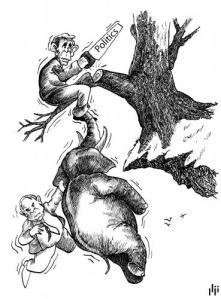Conservatism in the past half century has had mixed political fortunes. The ebb and flow has often fueled acrimonious debate among those who consider themselves to be the real conservatives. The factions include traditionalists, libertarians, neoconservatives, paleoconservatives, and those who simply call themselves “conservative.” We have the moderates in the northeast, the socially conservative in the south, the working class conservatives of the heartland, and the Ron Paul libertarians in the west all claiming ownership of the conservative movement, all giving their two cents as to which direction the Party should head. Such factionalization reveals, what seems to me at least, an identity crisis. What does it mean to be a conservative? What ideas, values, precepts should a conservative party espouse? Is there a common thread that can bind us all together into a strong unified party ? Complex questions require complex answers. But perhaps not. Perhaps one obvious reason for the crisis may be the lack of historical knowledge and perspective, which in turn, has led conservatism to be defined by our politics and not our intellectual superiority. The younger generation conservatives are (at least the un-apathetic ones) steeped in the political machine, but the depth stops there. (This is not to say ignorance isn’t pervasive in older generations, because it is. But my indictment is aimed primarily on the future of the party.) In fact, the more I think about it, the more I become convinced that the problem is exactly that – historical ignorance and intellectual immaturity.
Recently, I’ve come across profound ignorance in our current political debate, especially among my generation conservatives who appear to be fairly well educated. (Forget about the liberals – that’s a problem for another day.) It’s rational ignorance at best, a permanent stupor at worst, and a serious indictment of the future leaders of conservatism in general. I speak of folks active in Republican circles who speak adamantly about what is right and wrong with our country, who bemoan how much we’ve deviated from the original Republican party ideals, without having the slightest idea of the philosophical and intellectual seads that gave birth to post-WWII modern American conservatism. I’ve found much of the debates shallow and without knowledge of critical history. Such disregard for historical perspective is disappointing particularly when such disregard is practiced by those who take great pride in their ivy-league education. They speak in talking points. When asked to elaborate and to articulate their historical understandings, I get aroused babble. No depth or breadth. They throw out names like Reagan, Goldwater, and labels such as economic libertarianism, fiscal restraint, party of small government. Indeed, talking points and labels serve a purpose, but the value of that purpose is only realized when they are used by those who have at least a cursory understanding of where they come from.
A summer resolution of mine is to bone up on the contemporary origins of modern American conservatism and put pen to paper and record my knowledge and understandings. Because ultimately, it is philosophy that we lack, a historical knowledge and perspective. We don’t appreciate our intellectual forefathers. Without a clear philosophical and intellectual understanding of what it means to be a conservative, the Republican party, will continue in its current form – a fluid amoeba with no structure or focus. It will remain weak, flaccid. It will remain susceptible to the lame elements of the conservative movement. Thus, it is absolutely critical that the conservative philosophy remains constant and relevant in the minds of all conservatives. To this end, we must shave our heads and march back up to the temple, so to speak. (Well, maybe not so dramatic.) I will be posting throughout the summer as much as time permits on classical conservative philosophy, our intellectual forefathers, and their respective magna opera that shaped modern American conservatism (e.g. Edmund Burke’s Reflections on the French Revolution, Philip Reiff’s Triumph of the Therapeutic, and Russell Kirk’s Conservative Mind, all of which I will discuss in later posts).
American Confucius

